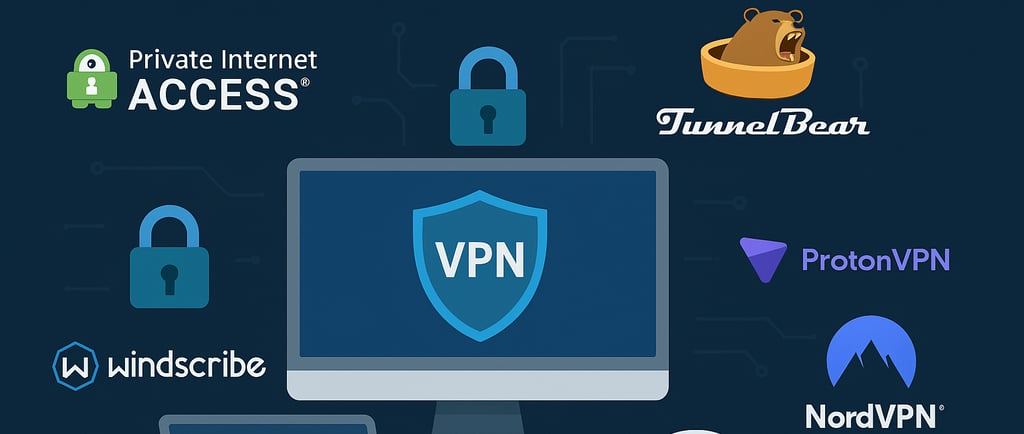How to Choose the Right VPN for You
VPN


With so many VPN services available, it can feel overwhelming to pick the right one. Some promise blazing-fast speeds, others highlight military-grade encryption, while free options claim to give you everything at no cost. The truth is that not all VPNs are created equal, and the best choice depends on your needs. This guide will help you understand what to look for when choosing the right VPN for you.
Step 1: Define Your Main Reason for Using a VPN
Not everyone uses a VPN for the same purpose. Identifying your goal is the first step:
Privacy & Security: If you want to stop ISPs, advertisers, or hackers from tracking you, look for a VPN with strong encryption, a no-logs policy, and advanced security features.
Streaming: If your goal is to unlock Netflix, Hulu, or sports streams from other countries, you need a VPN with servers optimized for streaming.
Gaming: For online gaming, low latency and fast speeds are more important than advanced features.
Travel & Remote Work: If you’re often on public Wi-Fi, reliability and cross-device compatibility are key.
Activism & Journalism: For maximum anonymity, you’ll want advanced tools like multi-hop connections and strong leak protection.
Step 2: Check Security Features
A VPN’s main job is to protect your data, so security should always come first. Look for:
Strong Encryption – AES-256 is the current gold standard.
Secure Protocols – OpenVPN and WireGuard are considered the most reliable.
Kill Switch – Ensures your data isn’t exposed if the VPN connection drops.
DNS & IP Leak Protection – Prevents accidental exposure of your real location.
Step 3: Review Privacy Policies
A VPN that logs your data defeats its purpose. Always check:
No-Logs Policy – Ensure the provider does not track or store your browsing history.
Independent Audits – Some top VPNs undergo third-party audits to prove their no-logs claims.
Jurisdiction – VPNs based in countries with strict data privacy laws (like Panama or Switzerland) are generally safer than those in surveillance-heavy regions.
Step 4: Consider Performance and Speed
No one wants a secure but painfully slow internet. Factors to consider:
Server Locations – More servers in multiple countries means better chances of fast connections.
Bandwidth Limits – Avoid VPNs that cap your usage if you plan on streaming or gaming.
Optimized Servers – Some providers have servers dedicated to streaming or torrenting.
Step 5: Evaluate Device Compatibility
The best VPN for you should work across all your devices. Check for apps on:
Windows & Mac computers
iOS & Android smartphones
Routers & Smart TVs
Browser extensions (Chrome, Firefox, etc.)
If you’re a heavy user, make sure the VPN allows multiple devices on a single subscription.
Step 6: Look at Customer Support
Even the best VPNs can run into problems. Quality support makes a huge difference. Look for:
24/7 Live Chat – Quick answers when you need help.
Guides & Tutorials – Step-by-step setup instructions.
Community Forums – Helpful for troubleshooting advanced setups.
Step 7: Balance Price and Value
While free VPNs may sound appealing, they often come with risks like data logging and limited security. Paid VPNs usually range from $3–$12 per month, depending on features and subscription length.
Pro tip: Many providers offer discounts for annual or multi-year plans, plus 30-day money-back guarantees so you can test risk-free.
Quick Checklist for Choosing a VPN
✅ AES-256 encryption
✅ OpenVPN or WireGuard support
✅ No-logs policy, preferably audited
✅ Kill switch + leak protection
✅ Global server coverage
✅ Works with Netflix, Hulu, etc.
✅ Multiple device support
✅ Reasonable price with a refund policy
Final Thoughts
The “right” VPN isn’t the same for everyone—it depends on your priorities. A gamer will value speed, a traveler will focus on Wi-Fi safety, and a journalist may require maximum anonymity. By carefully reviewing security features, privacy policies, performance, and cost, you can find a VPN that matches your needs and keeps you protected online.
Remember: don’t just go for the cheapest or most popular option. Take time to match the VPN to your digital lifestyle.